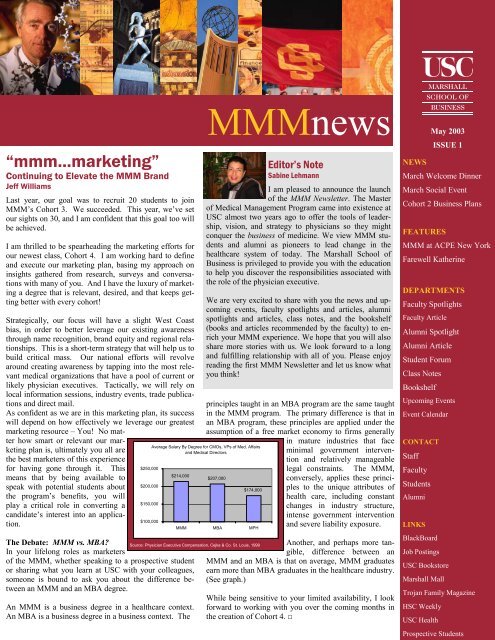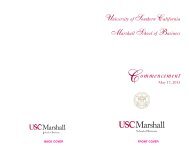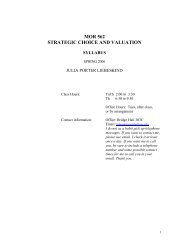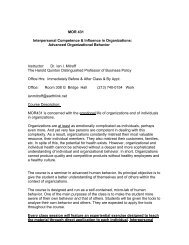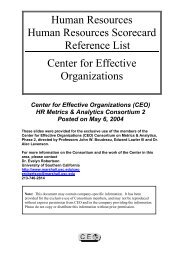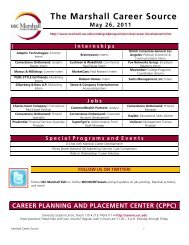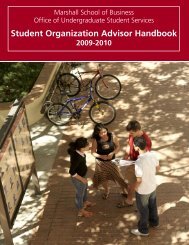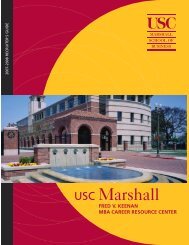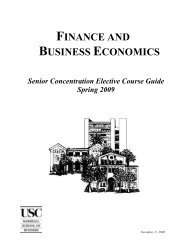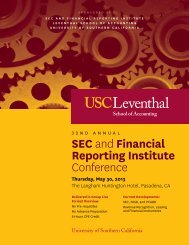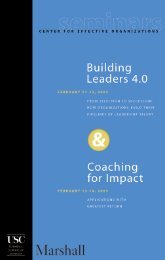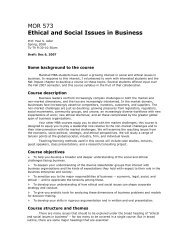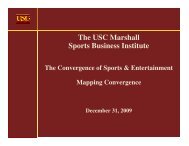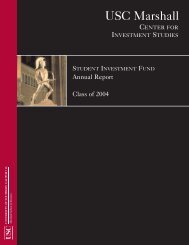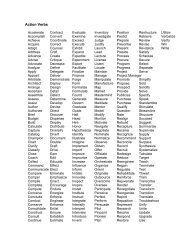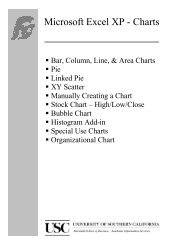MMMnews - USC Marshall - University of Southern California
MMMnews - USC Marshall - University of Southern California
MMMnews - USC Marshall - University of Southern California
Create successful ePaper yourself
Turn your PDF publications into a flip-book with our unique Google optimized e-Paper software.
“mmm...marketing”<br />
Continuing to Elevate the MMM Brand<br />
Jeff Williams<br />
Last year, our goal was to recruit 20 students to join<br />
MMM’s Cohort 3. We succeeded. This year, we’ve set<br />
our sights on 30, and I am confident that this goal too will<br />
be achieved.<br />
I am thrilled to be spearheading the marketing efforts for<br />
our newest class, Cohort 4. I am working hard to define<br />
and execute our marketing plan, basing my approach on<br />
insights gathered from research, surveys and conversations<br />
with many <strong>of</strong> you. And I have the luxury <strong>of</strong> marketing<br />
a degree that is relevant, desired, and that keeps getting<br />
better with every cohort!<br />
Strategically, our focus will have a slight West Coast<br />
bias, in order to better leverage our existing awareness<br />
through name recognition, brand equity and regional relationships.<br />
This is a short-term strategy that will help us to<br />
build critical mass. Our national efforts will revolve<br />
around creating awareness by tapping into the most relevant<br />
medical organizations that have a pool <strong>of</strong> current or<br />
likely physician executives. Tactically, we will rely on<br />
local information sessions, industry events, trade publications<br />
and direct mail.<br />
As confident as we are in this marketing plan, its success<br />
will depend on how effectively we leverage our greatest<br />
marketing resource – You! No matter<br />
how smart or relevant our marketing<br />
plan is, ultimately you all are<br />
the best marketers <strong>of</strong> this experience<br />
for having gone through it. This<br />
means that by being available to<br />
speak with potential students about<br />
the program’s benefits, you will<br />
play a critical role in converting a<br />
candidate’s interest into an application.<br />
$250,000<br />
$200,000<br />
$150,000<br />
$100,000<br />
The Debate: MMM vs. MBA?<br />
In your lifelong roles as marketers<br />
<strong>of</strong> the MMM, whether speaking to a prospective student<br />
or sharing what you learn at <strong>USC</strong> with your colleagues,<br />
someone is bound to ask you about the difference between<br />
an MMM and an MBA degree.<br />
An MMM is a business degree in a healthcare context.<br />
An MBA is a business degree in a business context. The<br />
<strong>MMMnews</strong><br />
Editor’s Note<br />
Sabine Lehmann<br />
I am pleased to announce the launch<br />
<strong>of</strong> the MMM Newsletter. The Master<br />
<strong>of</strong> Medical Management Program came into existence at<br />
<strong>USC</strong> almost two years ago to <strong>of</strong>fer the tools <strong>of</strong> leadership,<br />
vision, and strategy to physicians so they might<br />
conquer the business <strong>of</strong> medicine. We view MMM students<br />
and alumni as pioneers to lead change in the<br />
healthcare system <strong>of</strong> today. The <strong>Marshall</strong> School <strong>of</strong><br />
Business is privileged to provide you with the education<br />
to help you discover the responsibilities associated with<br />
the role <strong>of</strong> the physician executive.<br />
We are very excited to share with you the news and upcoming<br />
events, faculty spotlights and articles, alumni<br />
spotlights and articles, class notes, and the bookshelf<br />
(books and articles recommended by the faculty) to enrich<br />
your MMM experience. We hope that you will also<br />
share more stories with us. We look forward to a long<br />
and fulfilling relationship with all <strong>of</strong> you. Please enjoy<br />
reading the first MMM Newsletter and let us know what<br />
you think!<br />
principles taught in an MBA program are the same taught<br />
in the MMM program. The primary difference is that in<br />
an MBA program, these principles are applied under the<br />
assumption <strong>of</strong> a free market economy to firms generally<br />
Average Salary By Degree for CMOs, VPs <strong>of</strong> Med. Affairs<br />
and Medical Directors<br />
$214,000<br />
$207,000<br />
$174,000<br />
MMM MBA MPH<br />
Source: Physician Executive Compensation, Cejka & Co. St. Louis, 1999<br />
in mature industries that face<br />
minimal government intervention<br />
and relatively manageable<br />
legal constraints. The MMM,<br />
conversely, applies these principles<br />
to the unique attributes <strong>of</strong><br />
health care, including constant<br />
changes in industry structure,<br />
intense government intervention<br />
and severe liability exposure.<br />
Another, and perhaps more tangible,<br />
difference between an<br />
MMM and an MBA is that on average, MMM graduates<br />
earn more than MBA graduates in the healthcare industry.<br />
(See graph.)<br />
While being sensitive to your limited availability, I look<br />
forward to working with you over the coming months in<br />
the creation <strong>of</strong> Cohort 4. □<br />
May 2003<br />
ISSUE 1<br />
NEWS<br />
March Welcome Dinner<br />
March Social Event<br />
Cohort 2 Business Plans<br />
FEATURES<br />
MMM at ACPE New York<br />
Farewell Katherine<br />
DEPARTMENTS<br />
Faculty Spotlights<br />
Faculty Article<br />
Alumni Spotlight<br />
Alumni Article<br />
Student Forum<br />
Class Notes<br />
Bookshelf<br />
Upcoming Events<br />
Event Calendar<br />
CONTACT<br />
Staff<br />
Faculty<br />
Students<br />
Alumni<br />
LINKS<br />
BlackBoard<br />
Job Postings<br />
<strong>USC</strong> Bookstore<br />
<strong>Marshall</strong> Mall<br />
Trojan Family Magazine<br />
HSC Weekly<br />
<strong>USC</strong> Health<br />
Prospective Students
MMM Welcomes Students and Alumni<br />
Katherine Gfeller and Kristin Hartman<br />
Master <strong>of</strong> Medical Management Cohort 3<br />
The recent March residential session got <strong>of</strong>f to a lively<br />
start on Friday, March 14 th with a welcome dinner for<br />
alumni and students <strong>of</strong> Cohorts 2 and 3. Guests first enjoyed<br />
cocktails on the patio outside the Davidson Conference<br />
Center and then dinner in the Conference Center’s<br />
Vineyard Room.<br />
MMM faculty and staff were happy to welcome back<br />
more than half <strong>of</strong> the Cohort 1 class for Alumni Weekend:<br />
Ash Gokli, Bill Mills and daughter Laura, Walt<br />
Mills, Dick Morin, Kevin Ruggles and wife Sharon<br />
Haessley, Marvin Stein, and Rich Wyderski. In addition<br />
to students and alumni, several faculty members attended<br />
the dinner, including Delores Conway, Merle Hopkins,<br />
Rex Kovacevich, Dave Logan, and Bob Myrtle.<br />
MMM Faculty Advisor, Bob Myrtle, kicked <strong>of</strong>f the evening<br />
by welcoming Cohort 3 and introducing alumnus<br />
Dick Morin, who spoke<br />
about implementing the<br />
business plan he developed<br />
as part <strong>of</strong> his<br />
MMM degree: a hospitalist<br />
service at Bryan<br />
LGH Medical Center in<br />
Lincoln, Nebraska.<br />
Harris Levin and Dick Morin at the<br />
MMM Welcome Dinner<br />
Dave Logan, Associate<br />
Dean and Executive Director<br />
<strong>of</strong> the Office <strong>of</strong> Executive Development, welcomed<br />
the incoming class and spoke about the future <strong>of</strong> MMM at<br />
<strong>USC</strong>.<br />
We all had a good laugh<br />
when Dave presented Jim<br />
Florey, a Cohort Two<br />
student, with an award for<br />
"unparalleled MMM<br />
recruitment efforts while<br />
under anesthesia,” which<br />
referred to Jim highly<br />
promoting the MMM<br />
program to his surgeon<br />
just before knee surgery. Thanks, again, Jim! □<br />
Dave Logan speaking at the<br />
Welcome Dinner<br />
MMM at ACPE<br />
Dave Logan<br />
Sabine Lehmann, Michael Patmas, and I recently<br />
attended the Spring New York Institute <strong>of</strong> the<br />
American College <strong>of</strong> Physician Executives<br />
(ACPE) to present the <strong>USC</strong> MMM program to<br />
their members. We made two presentations, one<br />
to many <strong>of</strong> the newer ACPE physicians, and one<br />
to people who have almost completed their<br />
ACPE courses.<br />
I learned several things at this Institute. First,<br />
the combination <strong>of</strong> an MMM housed in a business school<br />
and with an entrepreneurial focus, like at <strong>USC</strong>, is very<br />
compelling to doctors. They <strong>of</strong>ten exclaimed, “You mean<br />
I leave with a business plan ready to go?!”<br />
Second, I learned that hearing from one <strong>of</strong> our graduates<br />
makes a real difference to current students and potential<br />
applicants alike. In his presentation, Michael Patmas<br />
(Cohort 1) didn’t emphasize what he learned. Instead, he<br />
spoke <strong>of</strong> how the program changed him and how these<br />
changes have resulted in significant career opportunities<br />
for him.<br />
Third, I discovered that successfully marketing this degree<br />
to new students requires a partnership between faculty,<br />
alumni, staff, and current students. Going forward,<br />
I’m eagerly anticipating working with all <strong>of</strong> you to build<br />
the brand equity <strong>of</strong> the MMM. □<br />
Also, I included in my presentation a summary <strong>of</strong> the position<br />
paper that Cohort 2 drafted. Stay tuned! We'll<br />
send copies to each <strong>of</strong> you when it is finished.<br />
Dave Logan is Associate Dean and Executive Director <strong>of</strong> the<br />
Office <strong>of</strong> Executive Development at the <strong>Marshall</strong> School <strong>of</strong><br />
Business. He teaches in the <strong>Marshall</strong> MBA, the Master <strong>of</strong> Medical<br />
Management, and in Executive Development programs.<br />
Farewell<br />
Katherine Gfeller<br />
On May 9, I will be leaving the Office <strong>of</strong> Executive Development<br />
to pursue a career in fund-raising with <strong>USC</strong>’s<br />
College <strong>of</strong> Letters, Arts, and Sciences. It has been an<br />
honor to work with all <strong>of</strong> you in launching the <strong>USC</strong> Master<br />
<strong>of</strong> Medical Management Program. Watching your<br />
accomplishments as entrepreneurs and participating in<br />
your learning process has been extremely gratifying. I<br />
hope that our paths will cross again, and I wish you every<br />
success in your role as physician executives. Thank you!<br />
Return to Table <strong>of</strong> Contents
Cohorts 2 and 3 Socialize<br />
Moroccan-Style<br />
Kristin Hartman<br />
The MMM March Social Event was held at the Figueroa Hotel<br />
To round out the recent March residential session, students<br />
from Cohorts 2 and 3 joined MMM faculty and<br />
staff for some well-deserved fun. The Moroccan-style<br />
festivities celebrated Cohort 2’s descent into graduation<br />
and Cohort 3’s take <strong>of</strong>f into the MMM program.<br />
The event was held on Thursday, March 20 th at the historic<br />
Hotel Figueroa. A well-known building in downtown<br />
Los Angeles, the Hotel Figueroa mixes Moroccan<br />
flavor with traditional 1920’s Spanish charm. An outdoor<br />
deck and sparkling pool <strong>of</strong>fered guests the perfect place<br />
to enjoy the early evening breeze.<br />
The revelry commenced with the serving <strong>of</strong> electric-blue<br />
“Moroccan Margaritas” and the playing <strong>of</strong> live classical<br />
Spanish guitar by the pool.<br />
As students chatted with one another, enjoying a break<br />
from classes, Flamenco dancers appeared and began the<br />
rhythmic and passionate steps <strong>of</strong> traditional flamenco.<br />
Their fiery movements and heated song enticed guests to<br />
get up and join in the fun.<br />
Following this performance, guests were ushered into an<br />
elegant Moroccan inspired dining room, where costumed<br />
waiters served a “family-style” Moroccan dinner. The<br />
menu included a sweet chicken dish, Bastilla, with<br />
chicken baked in filo dough and served with powdered<br />
sugar and cinnamon. Marinated eggplant, lamb and couscous<br />
followed. Dinner concluded with traditional tea and<br />
a Moroccan honey pastry.<br />
The students, flushed with drink and pride in their<br />
achievements, received a special surprise on the bus ride<br />
home. Each member <strong>of</strong> Cohort 2 received the traditional<br />
MMM graduation gift, a golf shirt reading Doctors <strong>of</strong><br />
<strong>USC</strong>. Similarly, Cohort 3 members each received a <strong>USC</strong><br />
baseball cap, the traditional gift to welcome new students<br />
to the MMM program.<br />
As the night’s festivities faded into memory, the members<br />
<strong>of</strong> Cohort 2 and Cohort 3, respectively, were one step<br />
closer to achieving a long-sought goal and one step nearer<br />
to making a new dream a reality. □<br />
MS, MD, MMM, FACP, CPE, FACPE is a<br />
board-certified internist, clinician-educator and<br />
physician-executive with extensive clinical,<br />
teaching, research and management experience.<br />
He is the director <strong>of</strong> the Providence Ambulatory<br />
Care and Education (PACE) Center in Oregon,<br />
where he has practiced since June 2000. In addition<br />
to his Medical Directorship at the PACE<br />
Center, Michael is a Clinical Assistant Pr<strong>of</strong>essor<br />
at Oregon Health and Science <strong>University</strong> in the Department<br />
<strong>of</strong> Medicine, Division <strong>of</strong> General Internal Medicine<br />
and Geriatrics. He also serves on the Facilities Planning<br />
Steering Committee at Providence Medical Center and is<br />
actively involved with several committees at the Providence<br />
Health Plan, including the Clinical Review Committee<br />
and the Pharmacy and Therapeutics Committee.<br />
Michael has also taught at the <strong>University</strong> <strong>of</strong> Nevada<br />
School <strong>of</strong> Medicine and the <strong>University</strong> <strong>of</strong> Pennsylvania<br />
School <strong>of</strong> Medicine, and has run a successful private<br />
practice.<br />
Michael is an avid skier and recently completed the Pr<strong>of</strong>essional<br />
Ski Instructors <strong>of</strong> America Level 3 Alpine Certification<br />
Exam at Mount Hood Meadows, Oregon. He is<br />
happily married to his wife Elyssa and has three children:<br />
Ariana, 14, Amanda, 9, and George, 7.<br />
Continued on page 9<br />
Michael A. Patmas<br />
This article originally appeared in the spring 2003 issue<br />
<strong>of</strong> The Pr<strong>of</strong>essional Skier, published by the Pr<strong>of</strong>essional<br />
Ski Instructors <strong>of</strong> America.<br />
Instructors—more than just about anyone else who provides<br />
a customer service role—have a keen understanding<br />
<strong>of</strong> behavioral science...the study <strong>of</strong> the vast landscape <strong>of</strong><br />
human action and reaction. With the publication <strong>of</strong> an<br />
article in the prestigious Harvard Business Review (June<br />
2001), it would seem that academia is now delving into<br />
the connections between good customer service and what<br />
makes people tick. The article “Want to Perfect Your<br />
Company’s Service? Use Behavioral Science,” by Richard<br />
Chase and Sriram Dasu <strong>of</strong> the <strong>University</strong> <strong>of</strong> <strong>Southern</strong><br />
<strong>California</strong>’s <strong>Marshall</strong> School <strong>of</strong> Business, carefully details<br />
recent research that led the authors to draw storng<br />
conclusions about how to leave people with positive, lasting<br />
impresssions <strong>of</strong> a product or service.<br />
Snowsports instructors have subscribed to a number <strong>of</strong><br />
these “memorable” principles for years, but ski schools<br />
might want to think about formally incorporating some <strong>of</strong><br />
them into their customer service training. While PSIA-<br />
AASI’s Core Concepts manual covers customer service<br />
in great detail, I’d like to suggest that the information<br />
passed along by Chase and Dasu.<br />
Alumni Spotlight<br />
Alumni Article<br />
Return to Table <strong>of</strong> Contents
Cohort 2 Presents their Business Plans<br />
Bill Crookston<br />
Final Business Plan Presentations were made on the first<br />
Sunday <strong>of</strong> the March<br />
session; the docs got<br />
ready to venture into<br />
Pr<strong>of</strong>essor Bill Crookston with entrepreneurial<br />
protégé Marcos Iglesias<br />
entrepreneurland by<br />
presenting to faculty<br />
judges and their peers.<br />
It was thrilling to see<br />
these students standing<br />
on the bridge they had<br />
built between MD and<br />
MMM. Their medical<br />
training was blossoming before our eyes, and students<br />
and faculty alike eagerly anticipated the fruit it would<br />
bear.<br />
The array <strong>of</strong> subjects<br />
and approaches presented<br />
was as varied as<br />
the doctors’ backgrounds.<br />
Most students’<br />
business plans<br />
were viable and will be<br />
realized outside <strong>of</strong> the<br />
From left: Jeff Huser, Verni Jogaratnam,<br />
Dave Civic, and Marcos Iglesias<br />
classroom. I felt like a proud father or midwife at the<br />
births <strong>of</strong> my students’ children.<br />
A high note <strong>of</strong> the presentations came when Ash Gokli<br />
spoke about the implementation <strong>of</strong> his business plan<br />
within the real world. A student from our first class<br />
(Cohort 1), Ash came back to Troy for the MMM program’s<br />
first reunion and to inspire the students <strong>of</strong> Cohort<br />
2 to make their business plans a successful reality.<br />
Currently, Ash is updating and modernizing his ER and is<br />
beginning to circulate smart cards, which store medical<br />
histories, to seniors within his community to allow for<br />
shorter admission wait times. People within Ash’s community<br />
are amazed that wait times within the ER are now<br />
even shorter than at a typical fast food restaurant. Ash<br />
has successfully transformed his unit into a prominent<br />
pr<strong>of</strong>it center <strong>of</strong> his hospital and continues to effectively<br />
help the sick and injured to heal.<br />
Ash’s presentation was inspiring and made the value <strong>of</strong><br />
each student’s MMM degree tangible. If any <strong>of</strong> the student’s<br />
plans get to even p = .5 success, then we will all be<br />
happy to share in Ash’s improvement in emergency delivery.<br />
His good humor and smile indicated to the soon to<br />
be graduates (Cohort 2), as well as the newcomers<br />
(Cohort 3), that their ability to improve their lives, careers<br />
and communities could be achieved through the entrepreneurial<br />
landscape.<br />
This is truly a wonderful journey that each student has<br />
undertaken and I’m so happy to have helped guide them<br />
through it. □<br />
Delores A. Conway<br />
is an Associate Pr<strong>of</strong>essor <strong>of</strong> Information & Operations<br />
Management specializing in statistics.<br />
Her areas <strong>of</strong> focus include multivariate methods,<br />
legal statistics, financial models and real<br />
estate economics. Her most recent research<br />
project, which measured the effects <strong>of</strong> green<br />
space on property values, was featured in the<br />
Spring 2002 <strong>Marshall</strong> Alumni Magazine. In<br />
addition, Delores has published a series <strong>of</strong> articles on statistical<br />
methods for legal cases involving employment<br />
discrimination. She serves on two national committees <strong>of</strong><br />
the American Statistical Association and is an associate<br />
editor for the Journal <strong>of</strong> the American Statistical Association.<br />
She has consulted with companies on the application<br />
<strong>of</strong> statistics for medical intensive care, college enrollments,<br />
security options, health care systems and environmental<br />
pollution.<br />
In 1999, Delores received <strong>USC</strong>'s highest honor, the <strong>University</strong><br />
Associates Award for Excellence in teaching. She<br />
was also named a Faculty Fellow for <strong>USC</strong>'s Center for<br />
Excellence in Teaching.<br />
Delores attended Stanford <strong>University</strong> where she received<br />
her M.S. and Ph.D. She received her B.S. in mathematics<br />
and B.S. in computer methods and statistics from the <strong>University</strong><br />
<strong>of</strong> Wisconsin.<br />
Merle W. Hopkins<br />
is a Pr<strong>of</strong>essor <strong>of</strong> Clinical Accounting at the<br />
Leventhal School <strong>of</strong> Accounting at the <strong>University</strong><br />
<strong>of</strong> <strong>Southern</strong> <strong>California</strong> (1995 to present),<br />
where he also served as the Assistant Dean and<br />
as an Assistant Pr<strong>of</strong>essor.<br />
Merle currently teaches financial accounting,<br />
managerial accounting and entrepreneurial finance<br />
in the <strong>USC</strong> Master <strong>of</strong> Medical Management<br />
program. Former engagements include Amgen,<br />
Security Pacific Bank, Union Bank, and several assignments<br />
with the <strong>USC</strong> Office <strong>of</strong> Executive Development.<br />
In 2002, he became the Regional Director <strong>of</strong> Beta Alpha<br />
Psi (the national honor fraternity for financial information<br />
pr<strong>of</strong>essionals) for the Western and Northwestern Region.<br />
Regional Directors sit on the national Board <strong>of</strong> Directors<br />
and collectively set the course for the future development<br />
for this organization. Merle is also on the <strong>USC</strong> Accounting<br />
Circle Board <strong>of</strong> Directors.<br />
Merle received his Ph. D. in Business Administration<br />
(Accounting) from Michigan State <strong>University</strong>, his<br />
M.S. in Accountancy from Western Michigan <strong>University</strong>,<br />
and his B.A. in History from Western Michigan <strong>University</strong>.<br />
Faculty Spotlights<br />
Return to Table <strong>of</strong> Contents
The Physician Executive—The Emergence <strong>of</strong> New Leaders for New Times<br />
Robert C. Myrtle and James Florey<br />
In the words <strong>of</strong> G<strong>of</strong>fee and Jones, “Why should anyone<br />
be led by you?” It might be easy to say that “based on the<br />
performance <strong>of</strong> our healthcare organizations so far, perhaps<br />
it is time for a new set <strong>of</strong> leaders, with a new vision<br />
and a new set <strong>of</strong> values” (G<strong>of</strong>fee and Jones, HBR, Sept.<br />
2000). But why is changing the leadership the answer?<br />
How can the physician executive make a difference?<br />
Weren’t physicians in charge not too many years ago? So<br />
what is so new or different now that only a physician executive<br />
can fill the void? What is his or her value proposition<br />
to a healthcare<br />
organization?<br />
executives with the knowledge and abilities to design<br />
learning organizations, to transform organizational cultures<br />
and systems, to encourage and model entrepreneurial<br />
behaviors, and to empower organizational participants<br />
to respond to these transformational changes.<br />
So how do physician executives add value to healthcare<br />
organizations? Their training in medicine provides a deep<br />
understanding <strong>of</strong> the processes underlying illnesses and<br />
diseases. Their training and experience in management<br />
provides a foundation<br />
in the means and<br />
methods <strong>of</strong> organizing<br />
cost efficient, effective<br />
processes. Their training<br />
in leadership enhances<br />
their capacity<br />
to construct, convey,<br />
and implement a passionately<br />
held, compelling<br />
shared vision with integrity. Their ability to lead and<br />
inspire systems <strong>of</strong> health care providers is empowered by<br />
the legitimacy <strong>of</strong> their MMM training and management<br />
experience and by the credibility <strong>of</strong> their having practiced<br />
medicine. Perhaps the greatest value added by physician<br />
executives is their shared respect for the integrity <strong>of</strong> the<br />
healthcare system as a whole, a respect for the needs <strong>of</strong><br />
all stakeholders, and a truly fiduciary perspective <strong>of</strong> being<br />
the fortunate stewards <strong>of</strong> societal trust. The MMM degree<br />
provides this framework for integrating medicine,<br />
management, leadership, and entrepreneurship.<br />
“[The physician executive] <strong>of</strong>fers a unique set <strong>of</strong><br />
skills drawing from both medical expertise and<br />
business savvy in order to confront the changing<br />
nature <strong>of</strong> healthcare head on.”<br />
While it may be an<br />
overstatement to suggest<br />
that the physician<br />
executive is the only<br />
one right for this job,<br />
certainly he/she <strong>of</strong>fers<br />
a unique set <strong>of</strong> skills,<br />
drawing from both medical expertise and business savvy<br />
in order to confront the changing nature <strong>of</strong> health care<br />
head on. The American healthcare environment is shifting<br />
rapidly, requiring the transformation <strong>of</strong> the way we<br />
approach health care. For example, fifty years ago we<br />
unraveled the basic structure <strong>of</strong> DNA. A few days ago,<br />
we essentially mapped the genetic code for humans. How<br />
these events will shape health care is as <strong>of</strong> yet undetermined,<br />
but surely the healthcare environment will be<br />
emergent, transformational, evolutionary, and non-linear.<br />
Exploiting these transformational events will require<br />
leaders with novel insights, an entrepreneurial spirit, and<br />
the adaptative learning to apply diverse leadership, management<br />
and clinical skills to roles that we have yet to<br />
envision. The physician executive certainly has these<br />
skills and more to assist him/her in leading the efforts to<br />
challenge and redefine America’s healthcare services,<br />
organizations and policies.<br />
One must acknowledge that health care is moving towards<br />
an inflection point—a point beyond our current<br />
“stable state,” which is in fact quite unstable and inefficient<br />
in meeting the demands <strong>of</strong> the public. In his book,<br />
Beyond the Stable State, Donald Schon points out that in<br />
transformational times, the ability to critically reflect on<br />
and challenge our “theories in use” is an essential factor<br />
to understanding changes that test our “traditional view <strong>of</strong><br />
the world.” He also notes that creating learning organizations—developing<br />
learning networks and learning systems—is<br />
an integral part <strong>of</strong> this process. Dave Logan<br />
extends this concept to learning-thinking-teaching organizations<br />
at <strong>USC</strong>. The MMM degree provides physician<br />
That last element <strong>of</strong> entrepreneurship may be the catalytic<br />
ingredient that allows physician executives to recognize<br />
the opportunities that reside within the complex and chaotic<br />
inflection point that health care is moving toward.<br />
Entrepreneurship may also provide these men and women<br />
with the courage and skills to pursue these emerging opportunities—opportunities<br />
that remain unrecognizable to<br />
those outside the realm <strong>of</strong> the physician executive. □<br />
Robert C. Myrtle is the Faculty Advisor for the Master <strong>of</strong> Medical<br />
Management Program. His key research interests are interorganizational<br />
relations, strategic decision making, and organizational<br />
and management effectiveness. He holds a joint appointment<br />
with the School <strong>of</strong> Policy, Planning, and Development<br />
and the School <strong>of</strong> Gerontology.<br />
James Florey is a MMM Cohort 2 Alumnus. He is Principal in<br />
charge <strong>of</strong> marketing and strategic development for Healthcare<br />
Receivable Solutions, Oakland, CA, and the former CFO for<br />
Primary Pediatric Medical Group, Inc., where he still practices<br />
general pediatrics and child behavior and development.<br />
Faculty Article<br />
Return to Table <strong>of</strong> Contents
“[I will] transform my organization’s culture<br />
and take my company from good to great.”<br />
Sherif Abdou<br />
Cohort 2<br />
Colin Scher (Cohort 3) on MMM Session I<br />
From talking to Cohort 3, the journey to <strong>USC</strong> and the<br />
MMM program has been a very different experience for<br />
each one <strong>of</strong> us. We have come from different countries,<br />
“The infectious<br />
energy and vital hope so<br />
tangibly present in the<br />
MMM cohort is<br />
amazing”<br />
different specialties and practice<br />
across the entire spectrum <strong>of</strong><br />
U.S. Healthcare. What has<br />
united us in a very real and immediate<br />
fashion is a strong desire<br />
to change from being reactive<br />
to proactive. We all want to<br />
change the healthcare system in<br />
one way or another, for the overall betterment <strong>of</strong> the patients,<br />
the physicians and the entire system. Most <strong>of</strong> us<br />
feel rather frustrated with our loss <strong>of</strong> pr<strong>of</strong>essional stature<br />
and dignity, as well as the <strong>of</strong>ten meaninglessly bureaucratic<br />
way in which our patients are forced to jump<br />
through the hoops <strong>of</strong> administrative protocol.<br />
My physician friends back home are disillusioned, angry<br />
and bewildered when they compare their pr<strong>of</strong>essional<br />
goals in medical school with their actual medical practice<br />
lives. They see very little upside for the future.<br />
The infectious energy and vital hope so tangibly present<br />
in the MMM cohort is amazing. We all feel that we are<br />
choosing to be different, and will not accept the status<br />
quo. This is wonderfully empowering. Our learning<br />
curve has been very steep (perhaps because we started<br />
with so little business knowledge!) thanks to the thirst for<br />
information encouraged by the strong faculty. We have<br />
found common ground and purpose, and we have already<br />
changed. The next year promises to be an unforgettable<br />
and life-changing experience.<br />
“I feel that session one has met and exceeded<br />
my expectations. Best <strong>of</strong> all, I feel<br />
energized by the faculty and my fellow students.”<br />
Jason White<br />
Cohort 3<br />
“I feel in the context <strong>of</strong> my organization,<br />
the program has given me valuable tools to<br />
excel as a leader. The program has helped<br />
me grow new opportunities and has<br />
changed how I view myself.”<br />
Jeff Huser<br />
Cohort 2<br />
Student Forum<br />
Suzana Makowski (Cohort 3)<br />
on Physician Executives<br />
I think that given a transition in medicine, incorporating<br />
business education into medical “I think that given a<br />
school education should be a necessity in the transition in medicine,<br />
future. This does not mean that each physician<br />
incorporating business<br />
will become an executive. Instead it perhaps<br />
will help foster a new career track: that <strong>of</strong> the<br />
education into medical<br />
physician executive, to round out the academic school education should<br />
tracks <strong>of</strong> clinician-educators, physicianresearchers.<br />
The time has come. It also does not future..”<br />
be a necessity in the<br />
mean that as soon as one has business training<br />
that one is a physician executive. Just as an MBA does<br />
not guarantee high level management and leadership<br />
status. On the other hand, I am not certain that 10-20<br />
years <strong>of</strong> clinical experience is needed.<br />
I propose that this track is regarded and respected as are<br />
the other tracks in medical education and pr<strong>of</strong>essional<br />
development, and rewarded accordingly. We need not<br />
have leaders emerge from the most prolific lab-bound<br />
physician researchers. Instead, those with vision for<br />
teams, for the qualities we have learned about here,<br />
should be identified and fostered in their development as<br />
clinicians and physicians. Just as research mentors are<br />
found for those interested in that track, physicianexecutive<br />
mentors should help foster careers and experience<br />
for younger physicians interested in leadership.<br />
Also, these efforts should be rewarded.<br />
Joe Hopkins (Cohort 3) on Leadership<br />
The ideal leader is a visionary who effectively communicates<br />
an organization’s mission and goals, and<br />
motivates others to excel in serving these objectives.<br />
S/he acquires power and respect<br />
through competence, skill and effectiveness,<br />
and then gives this power away to others by<br />
developing their abilities and empowering them<br />
to act. S/he is fair, gives constructive feedback,<br />
celebrates victories, awards credit and recognition,<br />
and insists on high performance. S/he attracts<br />
a talented team and spurs them to greatness;<br />
s/he generates excitement. S/he is well<br />
informed about external trends, threats and opportunities,<br />
as well as internal strengths and<br />
weaknesses. S/he has a passion for learning; s/<br />
he listens well. S/he foresees the larger sense <strong>of</strong><br />
the future and develops long range strategic plans. S/he<br />
takes calculated risks with new ideas, but modifies these<br />
promptly if they prove to be wrong. S/he is never entirely<br />
satisfied, knowing that what works today will fall behind<br />
tomorrow. S/he manages change effectively. S/he knows<br />
her/his own strengths and weakness, exploits the former<br />
and improves the latter. S/he develops a repertoire <strong>of</strong><br />
management skills and tailors those s/he uses to the situation.<br />
S/he maintains balance in life, has fun, and protects<br />
time for family, friends, personal growth and renewal,<br />
and care <strong>of</strong> physical health.<br />
“[The ideal leader]<br />
acquires power and<br />
respect through competence,<br />
skill and effectiveness,<br />
and then gives<br />
this power away to<br />
others by<br />
developing their abilities<br />
and<br />
empowering them to<br />
act.”<br />
Return to Table <strong>of</strong> Contents
Class Notes<br />
Cohort 1:<br />
Michael Patmas<br />
I'm currently a candidate for two really great jobs. One is an endowed department Chairmanship, the other is a CEO<br />
position. I should know within a few months if I get one <strong>of</strong> these jobs. I would not be a candidate for either without<br />
my <strong>USC</strong> MMM degree.<br />
But for something really exciting, I just passed the Pr<strong>of</strong>essional Ski Instructors <strong>of</strong> America Level 3 Alpine Certification<br />
Exam on April 19, 2003 at Mount Hood Meadows, Oregon. This is the highest certification level given by PSIA<br />
and it is a very rigorous and demanding exam with only about a 5-10% pass rate (so I'm told). It was particularly<br />
gratifying for me because I'm 51 years old and have a bad knee. Also, I failed it 3 times before! So, I'm kinda like a<br />
bad rash, I just keep coming back!<br />
I’d like Dr. Dasu and Chase to know that they are now famous in ski school locker rooms (aka après ski bars). Maybe<br />
I can cultivate some private lesson requests out <strong>of</strong> this? See, I learned a lot at <strong>USC</strong>-MMM – entrepreneurial thinking<br />
at its best!<br />
Do you have a personal or pr<strong>of</strong>essional<br />
announcement you would like to share?<br />
Cohort 2:<br />
Marilee Sipski and Tom Lammertse<br />
Our daughter Meredith has decided to attend Johns Hopkins <strong>University</strong>; Katherine at MMM will be interested to know<br />
that her hometown won out over <strong>USC</strong>. It was a very hard decision after all the wonderful things she heard about <strong>Marshall</strong><br />
from her mom and dad and the excellent opportunities available to her at <strong>Marshall</strong>. She has decided to be a Neuroscience<br />
Major with the Entrepreneurial Studies Program at Hopkins as her minor. I guess the apples really don't fall<br />
too far from the tree.<br />
Since we returned, we completed our URAC Accreditation for one <strong>of</strong> the subsidiaries I [Marilee] manage quality for<br />
(Network) and we are in the process for the on-site review <strong>of</strong> the other (UM and Workers' Compensation). I'll finally<br />
be able to unwind a bit when this is over, I hope.<br />
Tom and I and all the kids just returned from our Paris vacation on April 26th.<br />
Then, I attended the ACPE Vanguard meeting in New York. I couldn't pass up the opportunity to attend an ACPE<br />
meeting so close to home. <strong>USC</strong> was also represented by <strong>USC</strong> MMM Alumni, Sherif Abdou and Michael Patmas.<br />
Cohort 3:<br />
Colin Scher<br />
Email us with your news at<br />
mmmnews@marshall.usc.edu<br />
Colin’s daughter is graduating this Spring from the <strong>University</strong> <strong>of</strong> Michigan. Congratulations!<br />
Return to Table <strong>of</strong> Contents
Book Shelf<br />
The Cycle <strong>of</strong> Leadership:<br />
How Great Leaders Teach Their Companies to Win<br />
Noel M. Tichy and Nancy Cardwell,<br />
Harper Business; 1st edition (August 20, 2002)<br />
ISBN: 0066620562<br />
Noel Tichy shows how great companies and their leaders develop their business knowledge into "teachable<br />
points <strong>of</strong> view," spend a great portion <strong>of</strong> their time giving their learnings to others, sharing best practices, and<br />
how they in turn learn and receive business ideas/knowledge from the employees they are teaching.<br />
Have you read a good book recently?<br />
Preparing for Evil<br />
Ian Mitr<strong>of</strong>f and Murat C. Alpaslan<br />
Harvard Business Review (April 2003)<br />
Mitr<strong>of</strong>f and Alpaslan describe their more than 20 years <strong>of</strong><br />
research into crisis management strategies. Their findings<br />
are troubling--despite all <strong>of</strong> the attention on organizational<br />
crises they find that organizations continue to be<br />
unprepared. With healthcare organizations emerging as<br />
one <strong>of</strong> the key elements in the "War Against Terrorism"<br />
the lessons and insights from Mitr<strong>of</strong>f and Alpaslan are<br />
worth reflecting upon.<br />
The Innovator's Dilemma: When New<br />
Technologies Cause Great Firms to Fail<br />
Clayton M. Christensen<br />
Harvard Business School Press; (June 1997)<br />
ISBN: 0875845851<br />
In this revolutionary bestseller, Harvard pr<strong>of</strong>essor<br />
Clayton M. Christensen says outstanding<br />
companies can do everything right and still lose<br />
their market leadership, or worse, disappear<br />
completely. And he not only proves what he<br />
says, he tells others how to avoid a similar fate.<br />
Email us at<br />
mmmnews@marshall.usc.edu<br />
and tell us about it.<br />
Want to Perfect Your Company's Service?<br />
Use Behavioral Science.<br />
Richard B. Chase and Sriram Dasu<br />
Harvard Business Review (June 2001)<br />
Chase and Dasu <strong>of</strong>fer some very practical notions about<br />
what service oriented organizations can do to satisfy their<br />
customers. As health care becomes more "commoditylike"<br />
one feature that can make one provider stand out<br />
from another is "service quality". Becoming more<br />
"service oriented" begins by asking some very basic questions.<br />
Right from the Start<br />
Dan Ciampa, Michael Watkins<br />
Harvard Business School Press; (July 1999)<br />
ISBN: 0875847501<br />
Have you recently been handed a new leadership<br />
challenge? Are you about to start a new<br />
job, or are you expecting a big promotion? With<br />
today's surge in start-ups, spin-<strong>of</strong>fs, change initiatives,<br />
and reorganizations, chances are that<br />
you'll be in a position to accept a leadership role<br />
sometime soon. Before you do, let Right from<br />
the Start show you how to balance the tensions<br />
and challenges inherent in any leadership transition.<br />
It will prepare you for the <strong>of</strong>ten treacherous<br />
task <strong>of</strong> navigating an organization's strategy,<br />
politics, and culture so that you can<br />
smoothly and effectively get to work on your<br />
new agenda.<br />
Return to Table <strong>of</strong> Contents
Patmas continued from page 3<br />
Principle 1:<br />
Stick the Landing<br />
As someone who works in the service industry, you’ve<br />
likely heard the old saw that first impressions count.<br />
You’ve probably also been told that every moment is a<br />
“moment <strong>of</strong> truth” when it comes to working with customers.<br />
But are some moments truer – that is, more important<br />
– than others? Business research has revealed<br />
that customers tend to remember and judge experiences<br />
most <strong>of</strong>ten by their final impression. While it certainly<br />
doesn’t hurt to make a good first impression with your<br />
class, Chase and Dasu argue that it’s even more important<br />
to go out on a strong note. In combination with the notion<br />
that the human mind tends to store memories as a series<br />
<strong>of</strong> images (and replays them in a form that’s more akin to<br />
snapshots than movies) this concept strongly supports the<br />
idea that finishing a lesson on a high note will leave the<br />
guest with a positive final impression.<br />
The importance <strong>of</strong> the finale is something successful<br />
filmmakers have understood for years: conclude the story<br />
unceremoniously and people feel cheated out <strong>of</strong> the ending<br />
they’ve been anticipating; craft a strong ending for<br />
your work and you leave an indelible positive impression<br />
burned into your audience’s memory. The same “big finish”<br />
strategy work when you’re dealing with students on<br />
the slopes. Because your students’ most vivid memory<br />
will likely come from the final part <strong>of</strong> the lesson, be sure<br />
to try something special at the end: stick the landing!<br />
How many instructors do you know who finish a lesson<br />
abruptly and rush <strong>of</strong>f to the next lineup or the locker<br />
room? As you can imagine, they’re missing a great opportunity<br />
to really cinch the connection with the student.<br />
Before parting ways with my students, I try to make to<br />
last run really special by choosing terrain that will anchor<br />
the skills my students have worked on throughout the lesson<br />
and allow them to savor their progress. I also use<br />
goodbyes as opportunities to connect with each student.<br />
Handshakes and works <strong>of</strong> encouragement are a good<br />
send-<strong>of</strong>f for most, but sometimes hugs and high fives are<br />
appropriate if the chemistry between your and your students<br />
allows for this.<br />
There are many ways to make the end <strong>of</strong> a lesson special,<br />
and it’s just a matter <strong>of</strong> using your creativity. One thing<br />
I’ve found that leaves a big impression is homework.<br />
When clients are wrapping things up, I’ll write out some<br />
tips on a little notepad and hand them out as an assignment.<br />
With a class full <strong>of</strong> kids, I’ll finish up by asking<br />
everyone to put their pole tips together and then raise<br />
them high into the air for a Three Musketeers-style salute.<br />
With their poles in the air I have the children say, “All for<br />
one and all for me.”<br />
Principle 2:<br />
First things first<br />
As with the tendency to clearly remember the last things<br />
Continued Articles<br />
that happen to them, people generally hold onto the negative<br />
aspects <strong>of</strong> feedback if it is given at the end <strong>of</strong> the discussion.<br />
The implication in the context <strong>of</strong> a snowsports<br />
lesson is clear: if you need to point out something the<br />
skier is dong wrong, be sure to conclude by emphasizing<br />
the positive result <strong>of</strong> the changes you’re suggesting.<br />
From the student’s perspective, discovering areas in need<br />
<strong>of</strong> improvement and a lack <strong>of</strong> specific skills can be unnerving<br />
at any time during the lesson. Considering this,<br />
it’s preferable to deal with questions <strong>of</strong> improvement and<br />
correction earlier rather than later. There is strong evidence<br />
to suggest that customers recall experiences in a<br />
more positive light if the “bad news” is delivered early.<br />
A very vivid example <strong>of</strong> the wrong way to deliver criticism<br />
comes from my own experience as a ski student.<br />
Years before becoming an instructor, I took a group bump<br />
lesson at a Colorado ski resort. Near the end <strong>of</strong> the lesson<br />
I skied around a mogul, slammed hard into its trough, and<br />
crashed. The instructor immediately pointed me out to<br />
my fellow students and said, “You see that? That’s exactly<br />
what I don’t want you to do.”<br />
It was incredibly harsh and certainly beyond the pale with<br />
regard to what most <strong>of</strong> the instructors I know would say,<br />
but that incident is what I call a prime example <strong>of</strong> creating<br />
a negative experience that a student can’t forget. In<br />
fact, the embarrassment and pain I felt at that moment is<br />
all I remember from that day.<br />
People don’t want or need to be told that their skiing is<br />
bad. They just want to know how to be better. Word<br />
choice is very important to me, and during my lessons I<br />
will typically say something along the lines <strong>of</strong>, “I see a lot<br />
<strong>of</strong> things going well here, and there are a few things you<br />
can do to improve on what you’re already accomplishing.”<br />
Many people perceive criticism as a negative experience,<br />
so why not simply turn your observations into<br />
thoughtfully worded suggestions for positive change?<br />
Think <strong>of</strong> constructive criticism as a necessary evil, like<br />
broccoli, and the good news as something delectable, like<br />
chocolate. If you’ve identified things to work on earlier<br />
in the lesson, those bites <strong>of</strong> broccoli will be forgotten by<br />
the time the student’s finishing up with a chocolate sundae.<br />
Principle 3:<br />
Criticism and Reward<br />
Step metaphorically into your students’ boots by asking<br />
yourself two questions: (1) Do you prefer criticism continually<br />
throughout a lesson or just once? (2) Would you<br />
rather receive a generous helping <strong>of</strong> positive reinforcement<br />
multiple times over or just once? In an ideal world<br />
you could give lessons in which you’d never have to dole<br />
out any critiques, but that’s not a reasonable proposition.<br />
To put things in perspective, think about how you feel<br />
when you attend a clinic led by a hotshot examiner.<br />
continued on page 10<br />
Return to Table <strong>of</strong> Contents
Patmas continued from page 9<br />
If you’re anything like me, you probably have some concerns<br />
when you head out to a clinic or an exam. Whenever<br />
I attend a clinic there’s more than a little trepidation<br />
involved, and that’s only partly because I’m typically 20<br />
years older than the average instructor. For me, there’s<br />
always a concern in the back <strong>of</strong> my brain that I could end<br />
up dying during the lesson. I <strong>of</strong>ten think to myself, does<br />
the examiner know CPR? While they’re probably not<br />
necessarily worried about the same things I am, your students<br />
are likely to have concerns <strong>of</strong> their own. They’re<br />
certainly going to expect, and perhaps dread, that some <strong>of</strong><br />
the feedback will center on areas where they need to improve.<br />
The research cited in Chase and Dasu’s article suggests<br />
that it’s better to make suggestions for improvement in<br />
the beginning, rather than scatter it throughout the lesson.<br />
Conversely (and not surprisingly), positive comments<br />
from the instructor are a good thing when they’re sprinkled<br />
throughout a lesson. While the article doesn’t discuss<br />
the type <strong>of</strong> tone to use when you’re delivering input,<br />
it’s obvious that speaking to the student in a calm, patient,<br />
encouraging voice will help put him or her at ease. People<br />
also have affirmative memories <strong>of</strong> experiences if the<br />
positive reinforcement is dispensed frequently, so share<br />
your insights early on and deliver compliments many<br />
times along the way.<br />
Principle 4:<br />
Have it Your Way<br />
Most folks like to have a choice. The simple act <strong>of</strong> allowing<br />
students to decide on a lift or a run can immediately<br />
create a favorable experience within their overall<br />
memory <strong>of</strong> a lesson. Bear in mind, <strong>of</strong> course, that you<br />
need to be sure that the specific lift or run will provide a<br />
safe environment in light <strong>of</strong> your students’ abilities.<br />
When leading a group, I typically ask them to let me<br />
know what they’re up for. “What would you like to work<br />
on?” “What kind <strong>of</strong> terrain would you like to see?” “Who<br />
do you want to ride with on the chair?” “Tell me when<br />
you want to take a break.” While Chase and Dasu talk<br />
about giving some control over to the customer to build a<br />
commitment to future experience, I’d say that it’s just as<br />
important to forge the student’s commitment to simply<br />
stay in the lesson and keep his or her mind on what’s going<br />
on.<br />
In your teaching experience you’ve probably learned just<br />
how easy it is to “lose” a student. I’m not talking about<br />
misplacing them geographically; I’m talking about just<br />
holding someone’s attention. Sometimes a student will<br />
feel that things aren’t going exactly as planned and will<br />
mentally “check out” while waiting for the lesson to be<br />
over. Giving choices is one way to keep the students<br />
commitment and to keep his or her head in the lesson.<br />
Beyond empowering the student with options, choice<br />
builds self-confidence. A fascinating study cited in<br />
Chase and Dasu’s article revealed that patients perceived<br />
less pain when having blood drawn simply when allowed<br />
Continued Articles<br />
to choose the arm to be used for the draw! Therefore,<br />
give your students some choices and chances are they’ll<br />
enjoy the lesson even more.<br />
Principle 5:<br />
Rituals Count<br />
Do you suppose there are any rituals your customers<br />
might be anticipating during their lessons? According to<br />
research, it turns out that the customer’s expectations<br />
with regard to rituals can have a significant effect on how<br />
they perceive their lessons. In case you haven’t given<br />
any thought to such things, Chase and Dasu’s findings<br />
(backed by research from others in the same field) in the<br />
Harvard Business Review are irrefutable: ritual does matter.<br />
The power <strong>of</strong> tradition bears this out. It’s why we<br />
throw rice at the end <strong>of</strong> the wedding ceremony, why there<br />
are closing ceremonies at the Olympics, and why we always<br />
have a banquet the last night <strong>of</strong> PSIA’s National<br />
Academy.<br />
The discussion <strong>of</strong> rituals brings to mind something I experienced<br />
many years ago before I started teaching skiing.<br />
A marvelous teacher at Snowbird named Judy Fuller<br />
has a couple <strong>of</strong> unique rituals that really stick with students.<br />
The first ritual is her spot-on impression <strong>of</strong> the<br />
Wicked Witch <strong>of</strong> the West’s cackle from The Wizard <strong>of</strong><br />
Oz, and she uses it to great effect. While leading a group<br />
down a steep pitch in powder, she’ll eek out this spinetingling<br />
sound and you suddenly have an irrepressible<br />
urge to follow her. Without fail her students burst into<br />
laughter and take <strong>of</strong>f after her. The routine creates an<br />
atmosphere <strong>of</strong> lightheartedness and celebration that’s impossible<br />
to forget.<br />
Her other ritual involves ceremoniously handing out ski<br />
area pins to each student at the end <strong>of</strong> the class. Every<br />
year I’d fly out from New Jersey to Utah to ski with her,<br />
and I’d always look forward to the act <strong>of</strong> receiving my<br />
pin. Only now does it make sense why it mattered so<br />
much: Judy always finished the lesson with a very powerful<br />
and positive rite <strong>of</strong> passage for her students. In fact, it<br />
was the culmination <strong>of</strong> my experiences skiing with her<br />
that inspired me to become an instructor myself. (And<br />
it’s no surprise that the Snowbird Ski School recently<br />
gave Judy an award for having the most repeat customers.)<br />
Do you distinguish your lessons with one or two meaningful<br />
rituals? If not, maybe it’s time to start.<br />
Conclusion<br />
It doesn’t take a controlled study to recognize the basics<br />
<strong>of</strong> human behavior or the merits <strong>of</strong> customer service, particularly<br />
in the realm <strong>of</strong> snowsports. Even so, it’s gratifying<br />
to hear others confirm what we’ve known all along:<br />
that keeping guests happy and helping them develop good<br />
memories <strong>of</strong> their time with us will encourage them to<br />
come back for more. As we know (and this particular<br />
study confirms), good customer service is simply<br />
academic. □<br />
Return to Table <strong>of</strong> Contents
Cohort 2 Graduation<br />
Upcoming Events<br />
Cohort 2 will participate in Commencement activities on Friday, May 16, 2003.<br />
The <strong>University</strong> Commencement Ceremony will take place at the <strong>USC</strong> Alumni Memorial Park at 9:00 am. Ruth J. Simmons,<br />
President <strong>of</strong> Brown <strong>University</strong>, and former President <strong>of</strong> Smith College, is the 2003 Keynote speaker.<br />
Following the <strong>University</strong> Commencement, MMM graduates are invited to the MMM Commencement Luncheon and<br />
<strong>Marshall</strong> School Graduation Reception.<br />
MMM graduates will be awarded with their diplomas at the <strong>Marshall</strong> School Graduate Commencement Ceremony to<br />
be held in the Shrine Auditorium at 6:00 pm. Kent Kresa, Chairman and CEO, Northrop Grumman Corp. will be the<br />
Keynote Speaker.<br />
Cohort 3 Session II<br />
Cohort 3 will return to the <strong>USC</strong> campus July 11-19, 2003 for Session II: Managing Operations. We look forward to<br />
seeing them soon!<br />
Event Calendar<br />
Sun Mon Tue Wed Thu Fri Sat<br />
1 2 3<br />
4 5 6 7 8 9 10<br />
May<br />
2003<br />
11 12 13<br />
Research Seminar<br />
DNA damage<br />
responses in human<br />
cells<br />
323.669.4110<br />
14<br />
IGM 7 th Annual<br />
Symposium<br />
The role <strong>of</strong> genes in the<br />
physiology <strong>of</strong> heart<br />
disease<br />
323.442.2766<br />
15 16 17<br />
COHORT 2<br />
COMMENCEMENT<br />
18 19 20 21 22 23 24<br />
Matt Ridley discusses<br />
his book Nature via<br />
Nurture: Genes,<br />
Experience, & What<br />
Makes Us Human<br />
323.442.2766<br />
25 26 27 28 29 30 31<br />
See June & July<br />
Return to Table <strong>of</strong> Contents
Event Calendar<br />
Sun Mon Tue Wed Thu Fri Sat<br />
1 2<br />
Demographics<br />
Workshop:<br />
How Balanced is<br />
<strong>California</strong>’s Growth<br />
3 4 5 6 7<br />
213.821.1576<br />
8 9 10 11 12 13 14<br />
15 16 17 18 19 20 21<br />
June<br />
2003<br />
22<br />
Louise Reichlin &<br />
Dancers<br />
Bing Theater<br />
4pm-5:30pm<br />
213.385.1171<br />
29 30<br />
23 24<br />
Fannie Flagg reads and<br />
signs Standing in the<br />
Rainbow<br />
Doheney Library<br />
213.740.3270<br />
25 26 27 28<br />
Sun Mon Tue Wed Thu Fri Sat<br />
1 2 3 4 5<br />
6 7 8 9 10 11 12<br />
Cohort 3 Session II<br />
13 14 15 16 17 18 19<br />
Cohort 3 Session II<br />
20 21 22 23 24 25 26<br />
July<br />
2003<br />
27 28 29 30 31<br />
Return to Table <strong>of</strong> Contents
MMM FACULTY<br />
MMM ALUMNI<br />
MMM ALUMNI<br />
MMM STUDENTS<br />
Richard Bergin<br />
Cohort 1<br />
Cohort 2<br />
Cohort 3<br />
Tim Campbell<br />
Ash Gokli<br />
Sherif Abdou<br />
Andrea Brault<br />
Delores Conway<br />
Stuart Menaker<br />
Jamie Baisden<br />
Robbin Cohen<br />
Bill Crookston<br />
Walter Mills<br />
Steve Cavalier<br />
Tad Cowley<br />
Sriram Dasu<br />
Merle Hopkins<br />
Ron Kaufman<br />
Mark Kennedy<br />
Rex Kovacevich<br />
William Mills<br />
Richard Morin<br />
Michael Patmas<br />
Kevin Ruggles<br />
Kumar Saran<br />
Dave Civic<br />
Mohamed El-Nachef<br />
Jim Florey<br />
Phil Garrod<br />
Jeff Huser<br />
Bruce Cutter<br />
Terri Darcy<br />
Howard Fleishon<br />
Alberto Gedissman<br />
Steve Giannotta<br />
OFFICE OF<br />
EXECUTIVE<br />
DEVELOPMENT<br />
Dave Logan<br />
Associate Dean<br />
Executive Director<br />
Ravi Kumar<br />
David Logan<br />
Mike Mische<br />
Bob Myrtle<br />
Marvin Stein<br />
Yvonne Stratton<br />
Steven Szebenyi<br />
Richard Wyderski<br />
Marcos Iglesias<br />
Verni Jogaratnam<br />
Tom Lammertse<br />
Ann Murphy<br />
Joseph Hopkins<br />
Kurt Kodr<strong>of</strong>f<br />
Harris Levin<br />
Mark Lindsay<br />
<strong>MMMnews</strong> STAFF<br />
Sabine Lehmann<br />
Editor<br />
Kristin Hartman<br />
Copy Editor<br />
Mike Nichol<br />
Greg Patton<br />
Jim Nesbitt<br />
Ram Ramakrishnan<br />
Suzana Makowski<br />
William <strong>Marshall</strong><br />
Roman Stollenwerk<br />
Art Editor<br />
Nandini Rajagopalan<br />
Douglas Shook<br />
Marilee Sipski<br />
Troy Tyner<br />
Waldemar Rosario<br />
Colin Scher<br />
MMM<br />
PROGRAM STAFF<br />
Chris Valerian<br />
Bobby Youens<br />
Jason White<br />
Sabine Lehmann<br />
Associate Director<br />
Katherine Gfeller<br />
Program Specialist<br />
Kristin Hartman<br />
Program Specialist<br />
Roman Stollenwerk<br />
Program Assistant<br />
Jeff Williams<br />
Marketing &<br />
Recruitment Officer<br />
Return to Table <strong>of</strong> Contents<br />
<strong>MMMnews</strong><br />
mmmnews@marshall.usc.edu<br />
<strong>University</strong> <strong>of</strong> <strong>Southern</strong> <strong>California</strong><br />
Office <strong>of</strong> Executive Development<br />
3415 S. Figueroa, #107<br />
Los Angeles, CA 90089-0871


